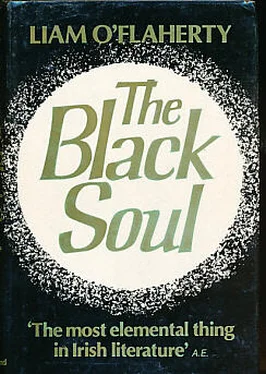The Stranger, dressing in his room, heard Little Mary laughing merrily in response to O’Daly’s bantering, and he became madly jealous of her. He was jealous not because he suspected that she did not love him – he took that for granted – but because she could laugh with another man. ‘Nonsense,’ he said to himself, ‘O’Daly is an old man, and I don’t love her anyway. What does it matter to me what she’does?’ But he was furious, nevertheless. Every time she laughed, the ringing sound with a ripple in the middle of it, as if it caught in her throat, struck at his chest like the flat base of a hammer. He finished dressing and sat on his bed pettishly, saying to himself that he wouldn’t go into the kitchen. Sitting there he discovered that he had never been jealous of any other woman in his life, and he decided that he must be becoming very weak-minded. ‘It’s this miserable existence that’s –’
Just then O’Daly shouted to him.
‘Oh, lawdy, lawdy dah! you take as long to dress as a woman.’
He laughed with pretended gaiety and strolled into the kitchen. He took a seat away from the fire so as to remain hidden from the light.
O’Daly eyed him up and down appraisingly.
‘Begob, yer putting on flesh,’ he said. ‘Now, what d’ye think o’ that. We’ll soon make a man of ye. And sure yer father, Lord have mercy on him, was a fine man … as good as the best.’
The Stranger shot a sharp glance at Little Mary and saw her smiling happily. He fumed and turned to O’Daly with a smile. He felt himself intensely flattered by O’Daly’s remarking his returning strength. He was, after all, a strong man. Fancy a strong man concerning himself about a miserable woman! Yes, he would put her out of his head.
‘I met your daughter Kathleen the other day,’ he said, laughing; ‘I am afraid she is trying to convert me.’
‘Upon my soul, she will before she finishes, although she made a poor job of myself. Mind ye, don’t fall in love with her. They all do. Although in my time we looked for a different kind. When I was young –’
The Stranger heard Little Mary make a movement, and forgot O’Daly immediately. His first impulse was joy at the success of his effort to make her jealous. Then immediately he despised himself for his meanness. She was smiling weakly at the fire, but her throat was throbbing, and the fingers of her right hand tapped her knee restlessly. Then she rose hastily and went into her room. She thought she would never get across the floor to her room. She threw herself face downwards on her bed and burst into tears.
‘So he is in love with Kathleen O’Daly,’ she gasped; ‘that skimpy girl, that empty-headed doll! Oh, if I had her head between my hands!’ Then she puckered up her lips and swept her hair back tightly from her forehead with her right hand. Her wet eyes hardened as she tried to arouse hatred against the Stranger. He had talked of Kathleen purposely to hurt her. She knew he had. She tried to persuade herself that she hated him and despised him, and did not want him any more. But then, as soon as she imagined life without him, she was seized with horror. Her mind, like a butterfly flitting among barren flowers, rushed terror-stricken from one thing to another trying to attach itself to some interest, but in vain. A black shroud descended on everything with a jeering rush as soon as she told herself that she didn’t want him. And a flood of tears gushed afresh from her eyes in her misery. Then, sobbing, she dried her eyes, her jealousy washed out by her tears. ‘No, no, I love him, whatever he does,’ she panted. ‘What else have I got?’ And she began to beseech heaven, the sea and Crom Dubh to blast everybody that ever bore the name of O’Daly. She poured out a torrent of mad words endlessly, until she had to stop breathlessly. Then she was satisfied.
The Stranger, endeavouring to listen cheerfully to O’Daly’s conversation, knew that she was weeping in her room, and he felt intensely ashamed of himself He longed to be able to go into the room to her and take her in his arms. But he felt Red John’s red eyes piercing his right cheek. They were like the eyes of a she-wolf whose cubs are stolen. Yet he laughed in response to O’Daly’s jokes. And his ability to laugh in such a situation made him feel that he was a cur. He wanted to get up and strike somebody. He was afraid of O’Daly, so he turned his wrath against Red John because he knew he was weaker than himself. He looked at him savagely. Red John, who had been looking at him malignantly, lowered his eyes and began to fidget with the fire. Then he rose and stretched himself with a foolish grin.
‘I must go and see has Long Bartly got a pitchfork to lend me,’ he muttered, and slunk out of the cabin. But he didn’t go to Long Bartly’s. He crossed up over the crags to where his black sheep were grazing on the cliff top and kept driving them up and down the crags all night. ‘Hist!’ he would say, throwing a pebble at them. ‘Let the fairies take you. What good are you to me? May the maggots eat you. I am eaten myself by the devils.’ And he would laugh like a child.
When Red John had gone out, O’Daly bent over close to the Stranger and whispered, ‘Something the matter with that fellow. How do they get on together?’ nodding his head towards the room where Little Mary was.
‘Oh, all right,’ said the Stranger. ‘Why?’
O’Daly looked at him curiously and then looked towards the fire, winking an eye.
‘She is a beautiful woman. You had better take care of yourself.’
‘Why?’ said the Stranger again, irritably.
‘Oh, nothing,’ whispered O’Daly; ‘women are the very devil.’
‘Oh, rot!’ said the Stranger, ‘I’m a man of the world.’
‘Hm, hm,’ said O’Daly; ‘it’s funny how young men always think they’re wiser than their fathers. Oh, well, I must be going. Good night, my good woman.’
Little Mary saw him to the door, begging him to stay longer and hoping in her heart that an evil demon would ‘cast the light of the morning sun on his rotting corpse.’ The Stranger walked down the road with him. They walked in silence for a while. Then O’Daly said: ‘I pity that poor woman. Begob, it hurts my soul to see a beautiful horse hurt or a beautiful woman living in poverty. The cruel injustice of the world.’
O’Daly, who, like most Irishmen of his type, had no sense of justice whatever, felt that at that moment he would give a fortune to get Little Mary out of her miserable surroundings. Yet he would have whipped her with pleasure and with equal sincerity and feeling of justice had a birthmark on her face irritated him. They say that he once, at the same sitting of the Parish Court in Kilmurrage, acquitted a man for opening a neighbour’s skull in a fit of anger, and sentenced another man to a month’s hard labour for tying a sharp cord around an old goat’s thigh. His type is almost extinct to-day in the country, which does not appreciate the impulsive strength of the iron men of old who were so close to merciless unjust nature.
Suddenly O’Daly stopped in the road and laid his hand on the Stranger’s shoulder.
‘Damn it, man,’ he said, ‘I don’t like to see you pining away here, wasting your life. It’s no place for a young man. I wouldn’t mind, but your father was one of the old tribe, one of ourselves. I know ye got good blood in you. Mind, I’m not pokin’ my old nose, but if there’s anything I could do … There now, what the hell am I talking about?’ And he began to curse loudly and gruffly in order to hide his sudden exposure of what he considered a disgraceful show of sentiment. The Stranger kicked the road and said nothing. ‘Hell to my soul,’ said O’Daly, catching his hand; ‘come over any time you’ve nothing to do and have a bottle with me. Don’t be too proud to visit an old man. Now good night, and God bless ye, my son.’ Then he stalked down the road cursing himself for having taken an interest in that ‘good-for-nothing weakling; how in the hell they breed them I don’t know.’
Читать дальше












